A Working Narrative
Since the early days of the COVID-19 pandemic, debates about the future of work have been a fixture of the zeitgeist. In the early days, we read and wrote about who would be working remotely. By mid-pandemic, we read and wrote about how remote work would…well…work.

Today we are all reading and writing about the most important question of all:
How much of this is going to be permanent?
No, this question is not new. It has been a part of the background to the discussion of remote work since the beginning. What IS new is that starting in late March and reaching a fever pitch by early June, we have observed two changes in the narrative structure of how remote work will continue or end as the pandemic fades in the United States.
First, we have observed that it has shifted from a background topic in the broader discussion of the workplace impact of COVID-19 to the dominant topic. In Epsilon Theory parlance, our measurement of its narrative attention has risen dramatically. This shouldn’t be surprising. Frankly it isn’t all that interesting, either. As CDC and state-level restrictions fall along with infection rates, of course businesses and companies are grappling with the question more than they were. So of course it is a more frequent topic of discussion. So of course it is grabbing more of the narrative attention, even from the perspective of a natural language processing algorithm.
Second, we have observed that the discussion has transitioned from a mess of generalized, survey-level musings about the future of work to a clearly bi-modal narrative structure. That is a fancy way of saying that there are two distinct narratives being promoted, each of which has some linguistic distance from the other, and each of which has relatively strong internal linguistic cohesion.
I’m sure you can guess what these two poles are: one camp arguing that remote work is here to stay, and the other arguing that rumors of the death of the office have been greatly exaggerated. Or something like that.
And that is true.
Or rather, it is true that there is a lot of missionary effort being expended to convince you and me that most companies and executives think about and are acting on these issues in one way or the other.
Well, it’s a little bit more complicated. It’s also a bit more interesting.
It’s more complicated AND more interesting because any time missionaries work to shape common knowledge, they often look for points of connection to other powerful topics and areas of mass interest. That’s the basic recipe for that deadly theatre we talk about so much. And there may be no topic with more potential such points of connection than the future of remote work.
It is inherently a COVID-19, vaccine and mask policy-related topic, so framing remote work in terms of the pandemic is almost unavoidable. The below network produced by the software from our friends at Quid gives you a little glimpse into what we mean. As a reminder, each dot represents an article from May 2021 about the future of remote work. Colors mean linguistically similar clusters. Distance and lines generally represent linguistic similarity. North/South directions have no meaning outside of distance. Bold-faced nodes in this network are those which are also about COVID, masks or vaccines. In all, that’s about 60% of the universe. And they’re everywhere. It is exactly what you would expect given the fundamental link in origin between the two topics.

Source: Epsilon Theory, Quid
The future of remote work is also, however, easily linked to general labor concerns, the role of work in American lives, corporatism and the social contract with our present system of capitalism. While nowhere near as widespread as COVID, the questions about whether and how American workers ought to return to offices is absolutely being linked to these topics.

Source: Epsilon Theory, Quid
It is also easily linked to labor shortages, the difficulties many business are having finding new candidates, and even public debate about topics like minimum wage.

Source: Epsilon Theory, Quid
It is easily linked to real estate, a hugely important topic.

Source: Epsilon Theory, Quid
It is easily linked to corporate profitability and worker productivity, which unsurprisingly tend to occupy some areas of the network not as populated by other linguistic patterns.

Source: Epsilon Theory, Quid
OK, so why do these connections matter?
They matter because one of the narratives is winning and one is losing.
“Remote work is here to stay” is winning.
“We should all go back to the office” is losing.
There’s a reason I picked a cover image for this brief from a webcomic called Work Chronicles, which in most of its output conveys more than a little bit of that good ol’ Late Stage Capitalism energy. The comic rose to the #1 slot of “r/All” on Reddit just a couple days ago, meaning that the website’s upvote-and-activity algorithm considered it the hottest post on the site.
You would find very much the same in our analysis of the most connected financial and political news in this network, or one from April, or from June to-date. The articles connecting the desire for a return to in-office work with the meaner, more sadistic side of corporate America are the most influential. They are the ones with the language that reverberates throughout the rest of the writing and conversation on the topic. No, that doesn’t mean that a huge swath of industries aren’t going to continue dragging employees back in, rolling back remote work authorizations and the like. Of course they are. It also doesn’t mean that there aren’t plenty of remote-friendly employers that are going to be tagged for the various ways in which their WFH policies are further blurring personal / professional boundaries and creating new paths to burnout.
- It means that – at least for now – everybody knows that everybody knows that companies that restrict remote work too heavily too quickly are outliers to be criticized.
- It means that – at least for now – employers who expect unquestioning compliance on an aggressive rollback of remote work and remote meeting practices are in for a rude surprise.
- It means that – at least for now – there is an expectation by markets, employees and commentators that remote work will continue to be substantially more widespread and accepted well into the future.
But leave aside which side we happen to think is winning the narrative battle. When missionaries are actively working to shape common knowledge, the share of information which will be presented to us in ways that seek to tell us how to think instead of giving us simple facts will be substantially higher. When the underlying topic is easily linked to other topics about which we may have strong emotional or philosophical attachments, we can be sure that those attempts to tell us how to think will be more likely to affect us, clear-eyed as I’m sure we all consider ourselves to be.
Regardless of how you feel about the subject, now is a time and this is a topic that should prod us to ask more than we usually would, “Why am I reading this now?”
Disclosure: This commentary is being provided to you as general information only and should not be taken as investment advice. The opinions expressed in these materials represent the personal views ...
more


